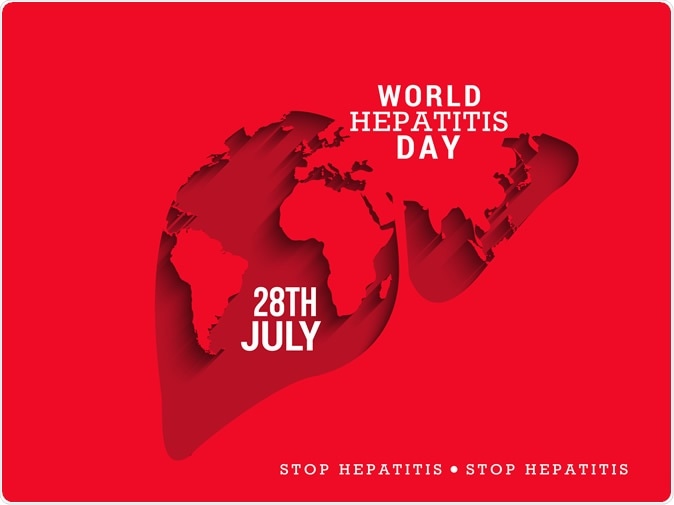July 28th is marked as world hepatitis day. The world is united in elimination of viral hepatitis by 2030. The World Health Organization (WHO) has published new data from 28 countries today and shown that nearly 70% of the world hepatitis burden is borne by these countries.
However national campaigns are in place and there is a momentum towards elimination of viral hepatitis. The report states that 86% of the countries that have been studied have a campaign in place along with hepatitis elimination targets.
Over 70% of the countries have started to develop a national hepatitis plan in order to start effective prevention of the disease and also early and effective diagnosis, treatment and care. Universal access to hepatitis treatment is also started by nearly half of the countries.

World Hepatitis Day. Image Credit: awsome design studio / Shutterstock
The report goes on to estimate that there are still 1.34 million deaths each year due to viral hepatitis and these numbers have risen by 22% since 2000. A World Hepatitis Alliance thus is set up and the member states are being urged to speed up diagnosis and early treatment efforts for hepatitis B and C.
According to Raquel Peck, CEO of the World Hepatitis Alliance, who is herself a hepatitis C survivor who is now cured, it is no longer a dream to eliminate hepatitis but targets seem achievable. Peck called forth countries and governments on World Hepatitis Day to “collaborate, identify and overcome the significant barriers” that are still present. Peck reminded the increasing number of hepatitis related deaths and urged for efficient testing and early treatment in all parts of the world.
The first-ever Global Hepatitis Report by the World Health Organization (WHO) was published this year. This was the baseline data that can measure the progress which would be made till 2030 in eliminating hepatitis B and C. Till date no baseline data on hepatitis was available in such a concrete and comprehensive manner.
World Hepatitis Day 2017 with this baseline data can now call for multi-stakeholder collaboration to move towards hepatitis elimination. The baseline data has shown that one of the easier targets in complete hepatitis immunization or vaccination for children.
Other relatively easier targets are eliminating mother-to-child transmissions. Peck said everyone is at risk of developing hepatitis and the whole community needs to come forth towards these efforts.
This year, the World Hepatitis Day campaign recognized by WHO, has asked people to show their face as support in a selfie using #ShowYourFace. This is to be posted along with a message of support towards the elimination goals. Peck said that the public is being asked to show their faces “in solidarity of the 325 million people living with viral hepatitis”.
Viral Hepatitis
Hepatitis B is a viral infection of the liver that is spread when contact is made with blood or blood products from an infected individual. Hepatitis B can be transmitted through contact with blood and bodily fluids and the following can therefore lead to infection:
- Blood transfusion with contaminated blood
- Unprotected sex, including anal and oral sex
- Sharing of infected needles between drug users
- During birth, from an infected mother to the baby
Hepatitis C infection is a liver infection caused by the Hepatitis C virus. Infection with hepatitis C may damage the liver leading to chronic infection. Hepatitis C infection is acquired by blood borne methods. Persons with the infection carry the virus in their blood and body fluids. Exchange of these body fluids with a healthy person leads to transmission of the infection.
The hepatitis C virus may be transmitted via blood transfusion, through exchange of saliva and semen or vaginal fluid of an infected person. It is most commonly spread via blood since the virus is concentrated in blood. Injection drug abusers are most commonly at risk of contracting the infection because they often share equipment.
According to the WHO estimated 325 million people were living with chronic hepatitis infections (HBV or HCV) worldwide in 2015.
Globally, 1.34 million people died of viral in 2015 and over 95% of people with hepatitis C can be completely cured within 2-3 months.
References